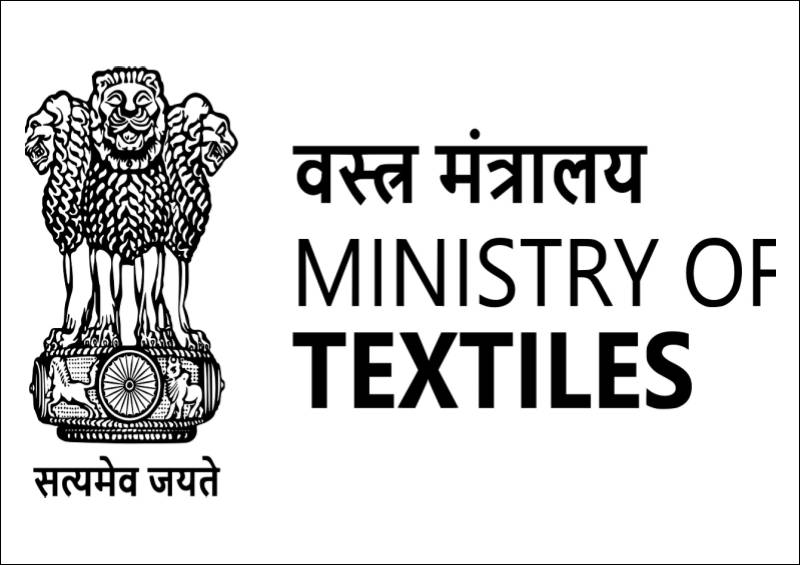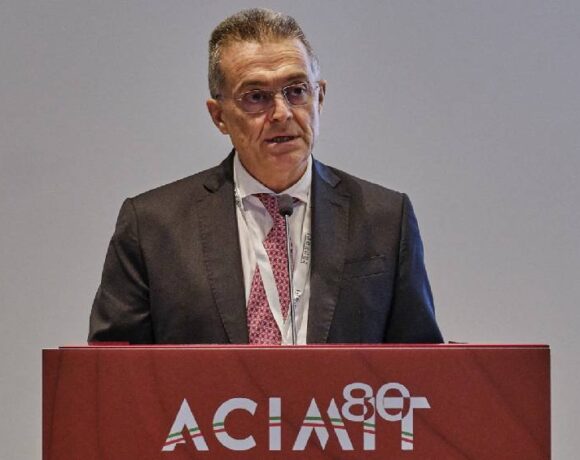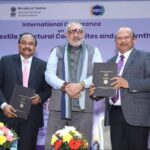Indian Ministry Of Textiles Showcases 2023 Achievements

The Indian Ministry of Textiles launched several initiatives in 2023, which include PM MITRA Parks, Kasturi brand cotton and garnered investment of around Rs 2,119 crore under PLI Scheme.
The initiatives also include 126 research proposals approved and valued at Rs 371 crore under National Technical Textile Mission (NTTM) for speciality fibre and technical textile.
PM MITRA Parks were launched in Tamil Nadu, Telangana, Gujarat, Karnataka, Madhya Pradesh, Uttar Pradesh & Maharashtra
The government launched PM Mega Integrated Textile Region and Apparel (PM MITRA) Parks scheme to develop world class infrastructure including plug and play facility with an outlay of Rs. 4,445 crores.
Nearly Rs. 70,000 crore investment and 20 lakhs employment generation is envisaged in the Parks, which will offer an opportunity to create an integrated textiles value chain at a single location.
The Government has approved the Production Linked Incentive (PLI) Scheme for Textiles with an outlay of Rs 10,683 crore to promote production of MMF fabrics and apparels and technical textile products.
The PLI scheme was envisaged to achieve size and scale and to become competitive.
The scheme has two parts of which Part-1 envisages a minimum investment of Rs 300 crore and minimum turnover of Rs 600 crore per company.
While, Part-2 envisages a minimum investment of Rs 100 crore and minimum turnover of Rs 200 crore per company
64 applicants were selected under the scheme with a proposed investment of Rs 19,798 crores and projected turnover of Rs 193,926 crore and proposed employment generation of 245,362.
As on September 30, the investment made under the PLI scheme was Rs 2,119 crore from 30 applicants, out of which 12 applicants have started commercial production.
Kasturi Cotton Bharat programme of Ministry of Textiles is a first of its kind branding, traceability and certification exercise to promote Indian cotton.
Farmers, ginners, spinners, weavers, fabric processors, garmenters, home textile producers and also brands will be involved in an effort to promote and enhance the value of Indian cotton in export markets.
The Ministry of Textiles is driving this initiative in a mission-oriented approach, allocating budgetary support of Rs 15 crores across three fiscals.
For Kasturi Bharat cotton, certification protocol has been finalised for standardisation of quality for 29 mm and 30 mm cotton, which is under long staple cotton category.
The sampling and testing will be carried out through authorised National Accreditation Board for Certification Bodies and NABL-accredited agencies or laboratories.
All the ginners in the country have been empowered to produce Kasturi Cotton Bharat brand as per stipulated protocol.
First lot of certified Kasturi Cotton was produced in the month of November 2023 by the Cotton Corporation of India Ltd.
The government has launched a National Technical Textiles Mission (NTTM) with an outlay of Rs. 1,480 crores.
The key pillars of NTTM include ‘Research Innovation & Development’, ‘Promotion and Market Development’, ‘Education, Training and Skilling’ and ‘Export Promotion’.
The focus of the mission is for developing usage of technical textiles in various flagship missions, programmes of the country including strategic sectors.
The mission got its extension until March 31, 2026, with a subsequent sunset clause applicable until March 31, 2028.
As on date, 126 projects valued at Rs 371 crores have been approved in the category of specialty fibres and technical textiles.
Guidelines have been launched to support indigenous development of high end machinery, equipment, tools and testing equipment for technical textiles in India.
These guidelines also include establishing indigenous platform for domestic design, development and manufacturing.
Guidelines to support startups and young scientists in the application areas of technical textiles have been approved in Empowered Programme Committee (EPC).
To ensure quality for both domestic consumption as well as imports, 87 items were identified to be brought under Technical Regulation/Quality Control Order (QCOs).
The Ministry has issued Quality Control Order (QCOs) for 19 items of geotextiles, 12 items of protective textiles, 20 items of agro textiles and 6 items of meditech textiles.
More than 100 BIS standards have been developed since inception of NTTM and SRTEPC has been assigned the role of the export promotion council for promotion of technical textiles.
26 such proposals worth Rs 151 crores have been approved under the IBID guidelines for up-gradation of laboratory facilities and training of faculty towards developing eco-system in technical textiles.
Under the Amended Technology Upgradation Fund Scheme (ATUFS), the ratio of MSME: Non-MSME is 89:11, while under previous versions of TUFS it was 30:70.
Higher incentives of 15 percent (Rs 30 crore) for entities for employment potential segments like technical textiles and garments or made ups.
Employment support has been provided to more than 17 lakhs over seven years. Out of total 3.9 lakhs new employment generated, 1.12 lakh or 29 percent are women.
In order to enhance the skills of the workforce in the textile sector, the government has launched Samarth under a skilling policy with the objective of providing opportunity for sustainable livelihood.
Under the scheme, 247,465 persons have been trained as on December 11, 2023
Bharat Tex 2024 is a global textile mega event being organised by a consortium of 11 textile export promotion councils and supported by the Ministry of Textiles and scheduled from February 26-29, 2024.
It will have dedicated pavilions on sustainability and recycling, thematic discussions on resilient global supply chains and digitisation, interactive fabric testing zones and product demonstrations.
There will also be master-classes by crafts persons and events involving global brands and international designers.
The mega event will feature an exhibition spread across nearly 20 lakh square feet area showing fibres, yarns, fabrics, apparel, home furnishings, handicrafts, technical textiles and much more.
It will also feature nearly 50 different knowledge sessions providing an excellent platform for knowledge exchange and information dissemination.















